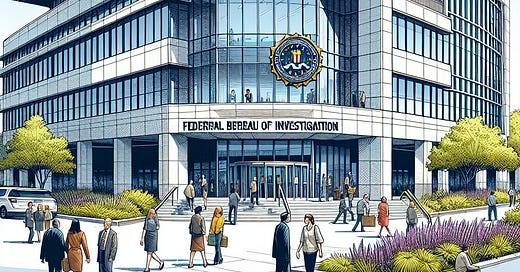Mark Twain has been credited with the quip that “history doesn’t repeat itself, but it often rhymes.” When it comes to corruption and the FBI, he may have been right.
In the late teens to early twenties, evidence began to trickle out in the media suggesting that an individual within the Executive Branch of the United States Government had profited significantly from his official position. Over the course of several years, it became clear that money had flowed from an energy company looking to secure favorable business deals to a self-dealing Executive Branch official. Millions changed hands and the Bureau was called in to investigate.
Yet, the Bureau wasn't actually there to investigate the corrupt official. They were there to investigate any person asking questions about the corruption. They were there as part of an effort to protect the high-level official from rightful scrutiny for his unexplainable wealth. They were there to intimidate those bringing to light misdeeds and corruption.
If this sounds familiar, it should.
You just may have the century wrong.
The Teapot Dome Scandal rocked the Republican administration of Warren G. Harding. The self-dealing and fraud that gave rise to the Teapot Dome Scandal ultimately resulted in the indictment, conviction, and imprisonment of a member of the President’s cabinet. And the behavior of the Bureau during the scandal resulted in the Attorney General being fired following President Harding’s death.
J. Edgar Hoover was brought in to reform the Bureau. By the time he took control of the law enforcement agency that would eventually become the FBI, the agency had been exposed as having been involved in spying on members of Congress in connection with Congressional investigations into the Teapot Dome Scandal. In the short 20 years of its history, the soon-to-be FBI had devolved from a professional law enforcement agency focused on combatting criminal behavior that crossed state lines to a tool for the party in power to harass and investigate political rivals.
Director Hoover purged the ranks. He saw the purge as a necessary step to change the politicized culture of the Bureau by removing agents and staff hired not on merit, but based on ideology. His later misdeeds aside, Hoover was right about the connection between personnel and policy and the need for a personnel reset at the Bureau.
Despite the fact President Harding was a Republican, it was a Republican Senator who arranged for the Senate to investigate the Teapot Dome scandal. And it was that same Republican who had his office ransacked—presumably by the Bureau—in response. The investigation into the Teapot Dome scandal was shockingly bipartisan. Yet it wasn’t the last time Republicans would demonstrate a willingness to investigate the apparent misdeeds of the Bureau under a Republican Administration.
50 years after the Teapot Dome scandal came to light, evidence again began to trickle out in the media. Questions again were raised whether the Bureau and the broader intelligence community were abusing their authorities and had been used by the Nixon Administration to spy on, investigate, and harass political opponents. Once again, Republican members of Congress rose to the occasion, recognizing the risks that the politically-driven abuse of law enforcement and intelligence authorities posed to the Republic. Republicans participated in the congressional investigations into Watergate and the accompanying abuses of Executive Branch authorities by the Bureau and the intelligence community. Republicans again put party aside and stepped forward and supported an investigation into a Republican Administration. The investigations resulted in significant changes to the Bureau, the broader intelligence community, and how Congress conducted oversight of both.
And here we are today. Another 50 years have passed. Again, evidence of misdeeds has trickled out in the media. Again, questions have been raised about the activities of the Bureau and whether the FBI’s authorities have been usurped for political purposes.
Yet, history has not actually repeated itself. Disappointingly, although not surprisingly, there is no Democratic Party support for a bipartisan investigation into the misdeeds of the Bureau under a Democrat Administration. They are unwilling to investigate one of their own, lacking the same fortitude, honor, and will to put the Republic over party that was demonstrated by Republicans following the Teapot Dome scandal and Watergate.
Unfortunately for our Republic, some in the halls of power appear to have read George Washington’s farewell address as instructions rather than words of caution. As the second greatest man ever to walk the earth once said, political parties are “likely in the course of time and things, to become potent engines, by which cunning, ambitious, and unprincipled men will be enabled to subvert the power of the people and to usurp for themselves the reins of government.” We near the 250th anniversary of our nation's declaration of independence from a nation and king where abuse of authority was the norm. Despite the passage of time, the words of our founding fathers are more important than ever.
We return to where we started and the quote from one of the greats of American literature: “history doesn’t repeat itself, but it often rhymes.” We are 50 years removed from the second major scandal involving the politicization of the Bureau, which itself happened 50 years after the first major scandal involving the politicization of the Bureau. Is anything rhyming yet?
Peter Navarro’s Substack account, including all individual article posts, are temporarily being handled and managed independently of him.
If you want to support Peter in his fight on behalf of our Constitution, unpaid subscribers can convert to paid, and paid subscribers can always try to share his posts with friends.




And hopefully it will be a Republican administration that will clean house in the FBI in seven months.
FBI / LIE